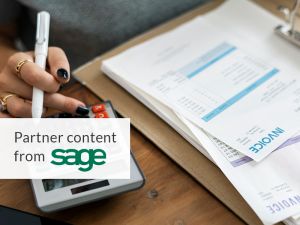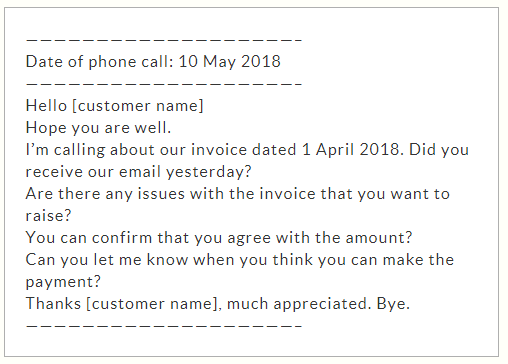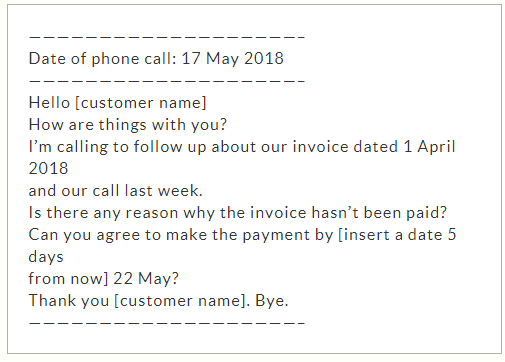
Chasing payments for overdue invoices can drain your energy and time away from running your business. Our friends over at accounting experts Sage, have provided a step-by-step guide on what to do if you find yourself in this situation.
Your best strategy against late payments is to either use a solution where payments are taken directly from your invoices or ensure your invoices are well-formatted – follow our guide to producing invoices so that you get paid on time.
For all our efforts, at times there will always be a client or customer who either doesn’t have the funds to pay or uses a tactic of delaying payments to manage their own cash flow.
Always remember that dealing with customers also involves good judgment and if you have a five-year relationship with a client and suddenly they don’t pay, then take the time to understand what is going on before jumping in with payment demands.
In most cases, if you haven’t been paid on a late invoice then you do need to act swiftly. Follow our guide below which explains how to recover overdue invoices.

If you do proceed to court recovery then you will need to prove that you followed a fair process so keep a record of all correspondence.
Summarise what was said and send a copy to the person you spoke to offering them opportunity to dispute what was agreed.
As a small business, you have protection and government guidelines stipulate that a customer must pay you within 30 days of receipt of your goods/service, unless you agreed other payment terms.
Anything agreed for longer than 60 days must be fair to both businesses.

Invoice is submitted on 1 April with 30 day net invoice payment terms.
After 30 days, on 30 April, payment is due.
After two days, send an email reminder.



 After 7 days
After 7 daysSend another email reminder.



Make a phone call.

Summarise what was said and send an immediate email as a record so that they have the option to dispute what was said and agreed within the call.

Another phone call.

Summarise what was said and send an immediate email as a record so that they have the option to dispute what was said and agreed within the call.
 After 7 days
After 7 daysSend a formal letter from your business.
Outline that interest is being applied to the debt and accruing and that the sooner they pay the invoice the less they will have to pay.

Under government legislation, you can claim interest for your invoice debt at 8% above base rate, applied from the date the debt became due.
Work out the annual interest:
[The amount you are claiming] x [8 + current base rate / 100]
£1,000 x 0.085 = £85 per year
Work out the daily interest:
[yearly interest] / 365
85 / 365 = 0.23p per day
For an invoice overdue by 30 days this would be: £6.90
 After 14 days:
After 14 days:Send a solicitor’s warning letter OR another formal letter directly from yourself that includes:
Inform the customer that you will be issuing a statutory demand OR proceeding to Court and filing a claim against them for the amount overdue plus any interest if they do not make payment within 7 days.
Make sure you can prove the letter was received by using a signed for delivery service. Seek legal advice on how to structure this letter.

At this stage it’s assumed that the relationship between your client/customer and yourself is at a non-recoverable stage and unlikely to result in more business from them.
If you do continue to work with them after this process, it’s advised that payment terms revert to all invoices being paid in advance (PIA).
The three options for debt recovery for a small business or individual
1. Mediation
At the first stage of any dispute and fall out it’s always best to try and recover the situation by using a mediation approach.
Sitting down together in a room and talking may uncover simple miscommunication or misunderstanding. Or, even embarrassment on the customer’s part for a situation that has spiralled out of control.
Potentially a cheaper cost than starting legal proceedings, mediation is a small fee and may help recover your unpaid debt.
You can find a list of mediators and fees in your local area with the online directory from the Ministry of Justice here.
2. Send a statutory demand
A formal letter that demands for payment will get the attention of your client who hasn’t paid their bill.
The customer then has 21 days to respond.
If the letter is ignored or they don’t pay you can apply to a court to make them bankrupt (debts over £5,000) or have their company wound up (debts over £750).
You can issue the letter yourself but you must understand the strict criteria to have it upheld.
The process and forms are clearly outlined here.
We advise seeking legal advice on how best to structure a statutory demand letter.
3. Court action
If the invoice hasn’t been disputed at any stage in your communication you can take court action. There is a simple online process for making claims under £100,000.
Before claiming, be sure that you can prove there has been enough communication between yourself and your customer so that they understand what your claim is for. The official protocol from the Justice Department states that both parties have exchanged sufficient information to:
(a) understand each other’s position;
(b) make decisions about how to proceed;
(c) try to settle the issues without proceedings;
(d) consider a form of Alternative Dispute Resolution (ADR) to assist with settlement;
(e) support the efficient management of those proceedings; and
(f) reduce the costs of resolving the dispute.
You can find a comprehensive guide for making a claim here.
You may be required to attend court if your customer disputes the claim so ensure that you follow all the stages outlined in the guide for claimants here and that all information is correct.
An incorrect name or address on an invoice can be enough to have a claim halted with you needing to reapply.
You can submit your claim here at Money Claim Online.
Once you have filed your claim your customer has 14 days to respond.

As a last resort, you can sell the debt to a specialist agency to recover a percentage of the invoice. Although, this could only be pennies on the pound. You can add the cost of the debt recovery to your claim.
By using a third-party service, this does mean that any relationship with your customer will most likely be irretrievable.
If you do approach a third party to recover the debt remember:
Getting paid on time can be as simple as making sure the content and layout of your invoices is clear and includes all the necessary information.

To help manage your time better you can use accounting software which can send professional invoices for you as you process orders instead of the time-consuming process of manually completing and sending your invoices.
Leaving you more time to focus on what you do best: build your business.
The information provided above is a guide only and is not a source of legal information. This article was written by Stacey McIntosh, editor-in-chief of Sage Advice UK
https://www.procopywriters.co.uk/2015/06/invoice-payment-well-overdue-heres-what-to-do-next/
https://www.moneyclaim.gov.uk/web/mcol/welcome
https://www.justice.gov.uk/courts/procedure-rules/civil/rules/pd_pre-action_conduct
https://www.gov.uk/statutory-demands/forms-to-issue-a-statutory-demand
https://www.gov.uk/options-if-youre-owed-money
https://civilmediation.justice.gov.uk/
https://www.gov.uk/statutory-demands/forms-to-issue-a-statutory-demand
Your own PA to look after calls, qualify leads, book appointments, and lots more.
Discover >Our team of PAs capturing every new enquiry and qualifying them during the call.
Discover >